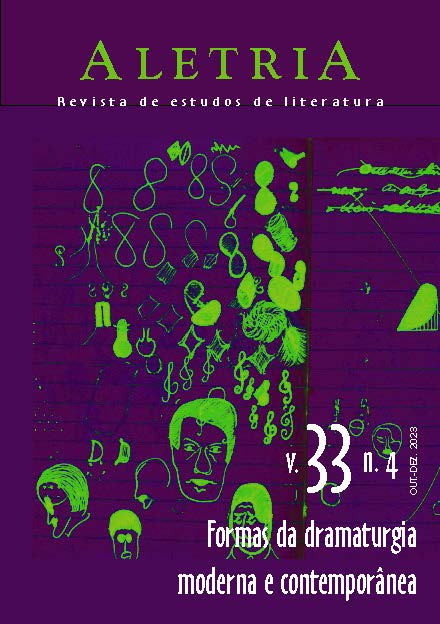O teatro na República de Weimar
tradução e apontamentos sobre Hoppla, estamos vivos!, de Ernst Toller
Keywords:
Hoppla, estamos vivos!, Ernst Toller, teatro político, teatro épico-dialético, teatro alemão, teatro e sociedadeAbstract
The play Hoppla, we are alive!, written by Ernst Toller and first performed with the direction of Erwin Piscator in 1927, is a fundamental chapter of political theatre. Written and performed during the so-called ‘golden years’ (1924-1929) of the Weimar Republic, the play makes a very accurate critical balance of the tensions and contradictions that are projected onto 1927, always seen from the perspective of the German revolution in 1919. Piscator not only directs but contributes with the dramaturgy, which also gains importance in its production context. Amazingly enough, the play succeeded in being badly evaluated by the left (who considered it defeatist), by the right (who branded it communist) and by theatre critics (who saw the abandonment of expressionism as a purported aesthetic step backwards). In this article, I try to make some considerations about the play in order to show its strenght. I also present part of my translation of the play, to be published soon.
Downloads
References
BENJAMIN, Walter. Sobre o conceito de história. In: BENJAMIN, Walter. Magia e técnica, arte e política: ensaios sobre literatura e história da cultura. Tradução de Sérgio Paulo Rouanet. 3. ed. São Paulo: Brasiliense, 1987. p. 222-234. (Obras Escolhidas, 1).
BIGEARD, Simone. Ernst Toller: Facetten eines schriftstellerischen Werks zwischen den Weltkriegen. Karlsruhe: KIT Scientific Publishing, 2017.
HERMAND, Jost. Hoppla, wir leben! In: HERMAND, Jost (Hg.). Zu Ernst Toller – Drama und Engagement. Stuttgart: Klett, 1981. p. 161-178.
JHERING, Herbert. “Hoppla, wir leben!“ Piscator Bühne. In: JHERING, Herbert. Theater in Aktion: Kritiken aus drei Jahrzehnten 1913-1933. Berlin: Argon Verlag, 1987. p. 282-285.
KÄNDLER, Klaus. Zwischen Masse und Mensch – Ernst Toller von der „Wandlung“ bis „Hoppla, wir leben!“ und „Feuer aus den Kesseln!“. In: HERMAND, Jost (Hg.). Zu Ernst Toller – Drama und Engagement. Stuttgart: Klett, 1981. p. 87-115.
KESTIES, Bert; LEYDECKER, Karl; MÜHLBACH, Lydia; PILZ, Michael; REIMERS, Kirsten; SCHÖNFELD, Christiane; UNGER, Thorsten. Textgeschichte. In: TOLLER, Ernst. Sämtliche Werke: Kritische Ausgabe. Stücke II – 1926-1939. Bert Kasties et alii. (Hgs.). Göttingen: Wallstein Verlag, 2015. p. 657-680. Bd. 2.
KREITNER, Angelika. Erwin Piscators Montagestil anhand seiner Inszenierung von ‚Hoppla, wir leben!‘. München: Grin Verlag, 2005. Disponível em: https://www.grin.com/document/88176. Acesso em: 21 jan. 2022.
LEYDECKER, Karl. The Laughter of Karl Thomas: Madness and Politics in the First Version of Ernst Toller’s „Hoppla, wir leben!“. The Modern Language Review, [S. l.], v. 93, n. 1, p. 121-132, Jan. 1998. DOI: https://doi.org/10.2307/3733628. Disponível em: https://www.jstor.org/stable/3733628. Acesso em: 19 dez. 2021.
PISCATOR, Erwin. Teatro político. Tradução Aldo Della Nina. Rio de Janeiro: Civilização Brasileira, 1968.
RÖTZER, Hans Gerd. Geschichte der deutschen Literatur: Epochen, Autoren, Werke. Bamberg: C.C. Büchners Verlag, 2000.
SCHÜRER, Ernst. Nachwort. In: TOLLER, Ernst. Hoppla, wir leben! Stuttgart: Reclam, 2011. p. 116-151.
SIMÕES, Cibele Forjaz. À luz da linguagem – iluminação cênica: de instrumento da visibilidade à “Scriptura do Visível”. Orientador: Jacó Guinsburg. 2013. 384 f. Tese (Doutorado em Artes Cênicas) – Escola de Comunicação e Artes, Universidade de São Paulo, São Paulo, 2013. Disponível em: https://www.teses.usp.br/teses/disponiveis/27/27156/tde-18112013-155400/publico/CIBELEFORJAZSIMOES.pdf. Acesso em: 10 nov. 2021.
TOLLER, Ernst. Hoppla, wir leben! Ein Vorspiel und fünf Akte. In: TOLLER, Ernst. Sämtliche Werke: Kritische Ausgabe. Stücke II – 1926-1939. Bert Kasties et alii. (Hgs.). Göttingen: Wallstein Verlag, 2015. p. 83-162. Bd. 2.
WILLIAMS, Raymond. O teatro como fórum político. In. WILLIAMS, Raymond. Política do modernismo: contra os novos conformistas. Tradução de André Glaser. São Paulo: Editora Unesp, 2011. p. 75-92.
Downloads
Published
How to Cite
Issue
Section
License
Copyright (c) 2024 Alexandre Villibor Flory (Autor)

This work is licensed under a Creative Commons Attribution 4.0 International License.
Authors who publish with this journal agree to the following terms:Authors retain copyright and grant the journal right of first publication with the work simultaneously licensed under a Creative Commons Attribution Non-Commercial No Derivatives License that allows others to share the work with an acknowledgement of the work's authorship and initial publication in this journal.Authors are able to enter into separate, additional contractual arrangements for the non-exclusive distribution of the journal's published version of the work (e.g., post it to an institutional repository or publish it in a book), with an acknowledgement of its initial publication in this journal.Authors are permitted and encouraged to post their work online (e.g., in institutional repositories or on their website) prior to and during the submission process, as it can lead to productive exchanges, as well as earlier and greater citation of published work (See The Effect of Open Access).





